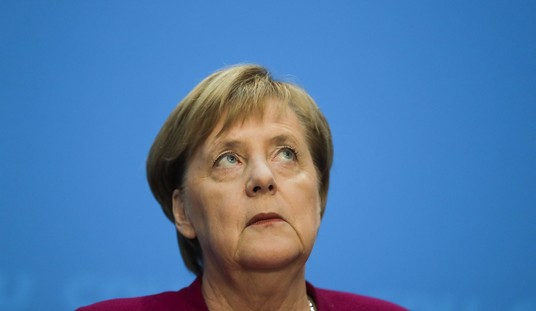The No. 1 priority in electing someone after President Obama should be finding someone who does not believe the world conforms to his worldview simply because he says it does. It’s a very dangerous state of mind. Speaking at a $15K-a-plate DCCC fund raiser tonight, natch, CBS correspondent Mark Knoller quoted Obama:
Pres Obama said “The world’s always been messy … we’re just noticing now in part because of social media."
— Mark Knoller (@markknoller) August 29, 2014
If Knoller weren’t so serious, you could be forgiven for thinking it was satire. After a barrage of “WHATs” and “WOWs” and “LOLWUTs” on Twitter, in came the grim mockery:
It’s a jolly good job there was no social media between 1939 or 1945 or that shit might have looked really serious.
— Charles C. W. Cooke (@charlescwcooke) August 29, 2014
https://twitter.com/michaelauslin/status/505474080142028800
Knoller offers the larger context of the quote, here. It’s all standard Obama newscast— late, longwinded, and with absolutely no agency for the America he helms whatsoever.
“Second reason people are feeling anxious is that if you watch the nightly news, it feels like the world is falling apart. (Laughter.) Now, let me say this: We are living through some extraordinarily challenging times. A lot of it has to do with changes that are taking place in the Middle East in which an old order that had been in place for 50 years, 60 years, 100 years was unsustainable, and was going to break up at some point. And now, what we are seeing is the old order not working, but the new order not being born yet — and it is a rocky road through that process, and a dangerous time through that process.
“So we’ve seen the barbarity of an organization like ISIL that is building off what happened with al Qaeda and 9/11 — an extension of that same mentality that doesn’t reflect Islam, but rather just reflects savagery, and extremism, and intolerance. We’ve seen divisions within the Muslim community between the Shia and Sunni. We continue to see an unwillingness to acknowledge the right of Israel to exist and its ability to defend itself. And we have seen, frankly, in this region, economies that don’t work. So you’ve got tons of young people who see no prospect and no hope for the future and are attracted to some of these ideologies.
“All of that makes things pretty frightening. And then, you turn your eyes to Europe and you see the President of Russia making a decision to look backwards instead of forward, and encroaching on the sovereignty and territorial integrity of their neighbors, and reasserting the notion that might means right. And I can see why a lot of folks are troubled.
“But — and here’s the main message I have for you — the truth of the matter is, is that American military superiority has never been greater compared to other countries. Our men and women in uniform are more effective, better trained, better equipped than they have ever been. We have, since 9/11, built up the capacity to defend ourselves from terrorist attacks. It doesn’t mean the threat isn’t there and we can’t be — we don’t have to be vigilant, but it means that we are much less vulnerable than we were 10 or 12 or 15 years ago.
“And the truth of the matter is, is that the world has always been messy. In part, we’re just noticing now because of social media and our capacity to see in intimate detail the hardships that people are going through. The good news is that American leadership has never been more necessary, and there’s really no competition out there for the ideas and the values that can create the sort of order that we need in this world.”
But the thing is there is competition. There always will be, and right now, it’s gaining ground, literally and figuratively, as Ross Douthat pointed out this weekend in the New York Times:
The idea that America’s foes and rivals are not merely morally but chronologically deficient, confused time travelers who need to turn their DeLorean around, has long been a staple of this administration’s rhetoric. Vladimir Putin, Bashar al-Assad and tyrants in general have been condemned, in varying contexts, for being on the dreaded “wrong side of history.” Earlier this year, John Kerry dismissed Putin’s Crimea adventure in the same language Obama used last week: “19th-century behavior in the 21st century,” foredoomed by its own anachronism.
These tropes contain a lot of foolishness. Where ISIS is concerned, though, they also include a small but crucial grain of truth.
The foolishness starts with the fact that the history of liberal democracy is actually inseparable, as Abram Shulsky writes in The American Interest, from “the constant appearance of counter-ideologies that have arisen in reaction against it.” Whether reactionary or utopian, secular or religious, these counter-ideologies are as modern, in their way, as the Emancipation Proclamation or the United Nations Charter. Both illiberal nationalism and Islamic fundamentalism are younger than the United States. They aren’t just throwbacks or relics; they’re counterforces that liberal modernity seems to inevitably conjure up.
So writing off the West’s challengers as purely atavistic is a good way to misunderstand them — and to miss the persistent features of human nature that they exploit, appeal to and reward.
Pretending these forces don’t exist or saying they’re going to lose does not actually make that happen, but I am fairly certain it’s accurate to say the President of the United States prefers to pretend it does.







Join the conversation as a VIP Member